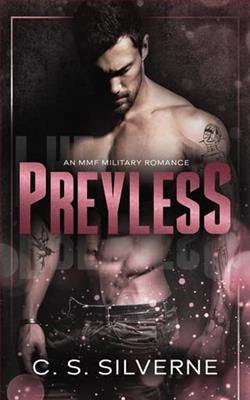Page 116 of Rosetti Family New York
He steps aside.
Inside, the front hall stretches out before me, but I ignore the rooms and head directly for the back door. At this time of day, he’ll be in the garden. I used to take the early morning shift, reading my poetry in peace, and he would take coffee there afterward.
I move forward, fast and deliberate, my shoes crunching evenly over the gravel like I’ve got it all under control.
I pat Mami’s knife, which is hidden under my coat, although if this comes to blows, I won’t stand a chance against his army of men.
Adrian Dushku waits, a perfect statue against the gray November sky. He’s standing near the concrete pond that serves as the garden’s centerpiece. The water is too dark to be inviting. A gardener tends plants in the distance, and it looks like the perfect tranquil scene, but I know men in suits are watching us through camera lenses, ready to strike. A few leaves that should have fallen still hang on to the trees. Their deep red almost looks like blood.
My father turns his full attention to me. His focus hits like a shot of cold air. I’m important enough to be the center of his universe, if only for a few minutes.
I stand there, ready to recite my lines, when I notice how he’s dressed. Open collar. No tie. It’s so unlike him. Even his sleeves are rolled up, like the very thought of effort makes him lazy.
I think of another time, when he wore a jacket over his pajamas, the only other time I’ve seen him out of a suit. The day that Mami died of her sudden ‘illness’. The day that changed my life.
I take a few steps closer. His pale gray eyes find me, then linger like they’re holding on to some important calculation. My lines dissolve in my head, but I can’t back down.
“Baba,” I say.
“Besiana.” He’s warmer than usual. His expression softens, all proud father. All mask. “The warehouse address was accurate.”
That’s as close as my father will ever get to thanking me, and I suppose I should be proud. But all I taste is ash, and I run my tongue across the inside of my teeth to get rid of the flavor.
“I came to talk about that,” I say, pleased my tone remains even, though my heart is racing.
“Do you have more information for me already?” His eyes narrow. “I still need the chemist or, at the very least, the formula for the drug. Every day that passes puts our family in more danger.”
“Danger?” I ask, a sarcastic edge to my words. “Danger of what?”
“Of losing to the Rosettis.”
I scoff. “Is that all? You told me my whole life that the Rosettis are ruthless and evil. But you’re worse than they’ve ever been. You’re willing to sacrifice your own family.”
His eyes narrow, the softness gone. “Watch your tone, girl.”
I straighten my shoulders, trying to appear stronger than I feel. But fear and determination rush through my veins, tripping over each other to take over. His gaze is crisp and cold, chipping away at my resolve. The wind shifts, and it smells like winter is coming. Like everything is about to die.
I scoff, and at the sound, his expression barely changes, but I see it. The faintest twitch at the corner of his eyes.
“I’m protecting you,” he says, sounding more apathetic than protective. “I’ve done you the courtesy of keeping up this arrangement, diverting the blame of the warehouse attack to the Russians, even though it puts us all at risk.” He pauses, and I hear the threat around the edges. “But that courtesy doesn’t have to extend forever.”
I’ve played this game for twenty-six years. Being the good daughter. Being the spy. But if it’s a choice between followingMami or living my life as his tool, I know what I have to do. He’s a chess player, and I’m done being the pawn in his game. My lines come back in a rush, and I clutch onto them as though they might save me.
“I won’t spy for you anymore. I’m out.”
A flicker of something in his eyes. Too fast to know what. Then a patient smile, as though I’m just a child with some impossible request.
I’m ten years old. I want a puppy. I want to see my friends. I want anything that’s not this life.
“No,” he says like he’s correcting a small mistake. He glances at my coat, an eyebrow raised, then back to my face. “What are you thinking, showing up wearing Italian?”
“I’m thinking I don’t need you.” I lift my chin.
“Are you?” He crosses his arms.
I don’t blink. “You’re done using me.”
He stares, eyes narrowing. Calculating. It’s worse than if he were angry. A loud crack echoes, like a gunshot, and my heart lurches. I turn fast. The head of security is standing by the entrance. His focus is trained on me, expressionless, his arms folded across his chest.















